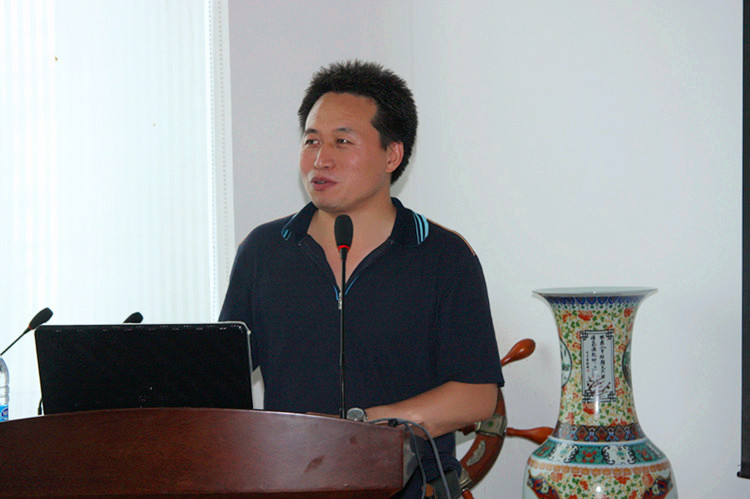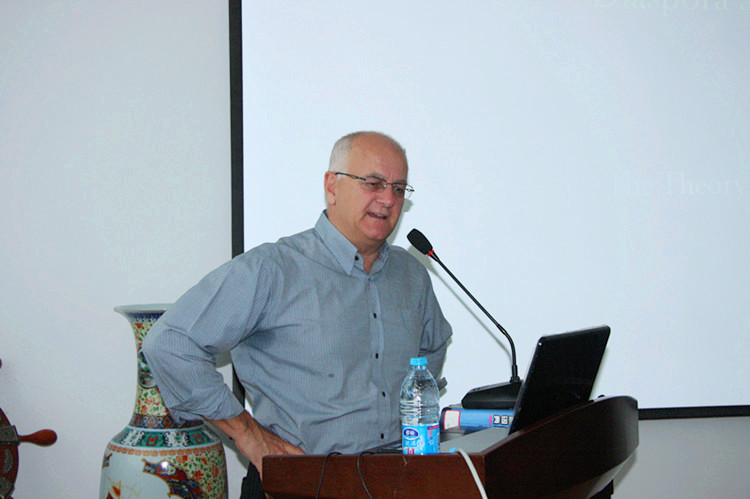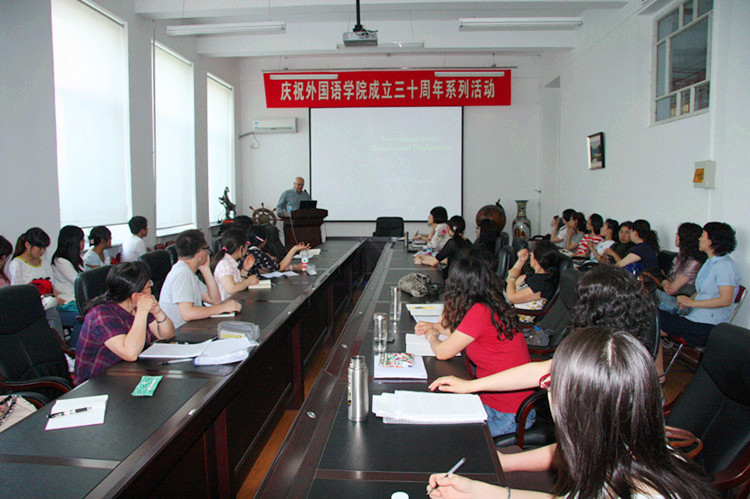比尔・阿什克罗夫特教授最后一场关于后殖民研究的讲座――《离散文学》于今天下午2:00在williamhill威廉希尔网址机械楼3036室举行。
今天这个讲座是比尔・阿什克罗夫特教授回澳大利亚前的最后一场讲座,比起前三场讲座吸引了更多的观众。今天讲座的主题是离散文学。离散的定义非常复杂。离散者是侨居海外的少数民族群体,他们被最初的中心驱逐到边缘环境; 他们保持着关于自己最初家乡的“记忆、梦想和神话”; 他们相信他们不会或不会完全地被东道国接受;他们将祖先的家乡作为自己最后的归宿;他们全力维护或重建他们的故乡;他们内部团结一致且与故乡紧密相连。离散的群体面临着来自性别、种族、阶级、宗教、语言、代沟以及主流文化的问题。而离散族群中的女性生活更加艰难,她们承受着来自物质流放和精神流放的双重不安,既要工作,又要照顾家庭,还要承受父权的压迫。对于离散者最大的问题还是来自文化身份和主体性,两者都面临着挑战和妥协。
阿什克罗夫特教授已经给听众带来了四次精彩的讲座,听众已经熟悉他,所以气氛轻松而愉快。“最后的讲演”对于听众来说更加宝贵,所以他们珍惜机会向教授阿什克罗夫特提问。刘克东教授关于离散与边界问题,以美洲印第安人为例,讨论到底是谁擅闯了边界。阿什克罗夫特教授风趣地补充道:美洲印第安人不曾跨越边界,是边界跨越了他们。一位学生询问有关身份的转变,她举的例子是如果一个人出国,而国外的生活远远比家里好,所以这个人不希望返回家乡,那么他或她的身份就改变了。关于这个问题,阿什克罗夫特教授告诉听众,还存在着第三种离散,即这些人的记忆被锁定在过去,但故乡正在改变。接下来,阿什克罗夫特教授又回答了听众提出的多个问题,无论是听众还是阿什克罗夫特教授都很享受这最后一次讲座。
阿什克罗夫特教授的系列讲座圆满结束了,哈工大英国威廉希尔唯一官网仍将尽力举办更多的精彩纷呈的讲座。请关注哈工大英国威廉希尔唯一官网的相关通知,不会让你失望。
Professor Bill Ashcroft’s Last Lecture at HIT: Diaspora
Professor Bill Ashcroft gave his last lecture, Diaspora, at 2:00 pm in Room 3036 of Jixie Building of Harbin Institute of Technology (HIT).
Today the lecture is Professor Ashcroft’s last one before he goes back to Australia, which attracts more audience than the former three. This lecture is about Diaspora and Displacement. The definition of diaspora is very complicated. Diasporas are expatriate minority communities that are dispersed from an original "center" to at least two "peripheral" places; that maintain a "memory, vision, or myth about their original homeland"; that "believe they are not-and perhaps cannot be-fully accepted by their host country"; that see the ancestral home as a place of eventual return, when the time is right; that are committed to the maintenance or restoration of this homeland; and whose consciousness and solidarity as a group are "importantly defined" by this continuing relationship with the homeland. The diasporic community meets many problems about gender, race, class, religion, language, generation, and relationship with the majority culture. Life for women in diasporic situations can be doubly painful---struggling with the material and spiritual insecurities of exile, with the demands of family and work, and with the claims of old and new patriarchies. The most serious problem of the diasporas is that they also have to suffer the challenge and shifting of their cultural identity or subjectivity
As Professor Ashcroft has given four lectures, the audience is familiar with him and the atmosphere is relaxing and pleasant. The last lecture is more precious for the audience, so they cherish the chance to ask Professor Ashcroft questions. About the borders of the diasporas, Professor Kedong Liu takes the American Indians as example for the issue who trespass the border. Professor Ashcroft humorously complements that the American Indians do not cross the border, but it is the border that cross them. A student asks about the shifting of identity, and he takes the example that a person goes abroad and the life is much better than at home, so the person does not want to return and his or her identity is changed. Relating to this question, Professor Ashcroft tells the audience that there is also the third way of diaspora, which means the diaspora’s memory is locked in the past, but the home is changing. There are also more questions and answers, and both the audience and Professor Ashcroft enjoy the end of the last lecture.
Professor Ashcroft’s series of lectures has successfully come to an end, and the HIT School of Foreign Languages will try its best to host more brilliant and wonderful lectures. Please pay attention to the relevant notice from the HIT School of Foreign Languages. You will not be disappointed.
By Catherine Junmin LIU

英国威廉希尔唯一官网院长助理刘克东主持讲座

Bill Ashcroft在讲座

讲座现场